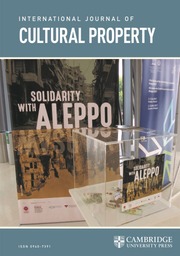Article contents
When data become people: archaeological ethics, reburial, and the past as public heritage
Published online by Cambridge University Press: 18 February 2005
Extract
In the United States, consideration of archaeological ethics has been relatively recent and concerned primarily with defining professionalism. By declaring that the past is a public heritage, claiming that archaeologists should be its stewards, and moving toward a positivist scientific approach, American archaeology has alienated its public. Prompted by pressure from Native Americans on the reburial issue, the Society for American Archaeology has attempted to address the problems by proposing an ethics code, but outsiders are likely to see the contradictions between stated principles and practice. These issues are examined from the perspective of the reburial issues, offering the possibility that an ethnocritical archaeology might provide mechanisms that will allow archaeologists to be more truly accountable and, in the long term, better stewards of the past.
- Type
- Research Article
- Information
- Copyright
- © The International Cultural Property Society
- 7
- Cited by




